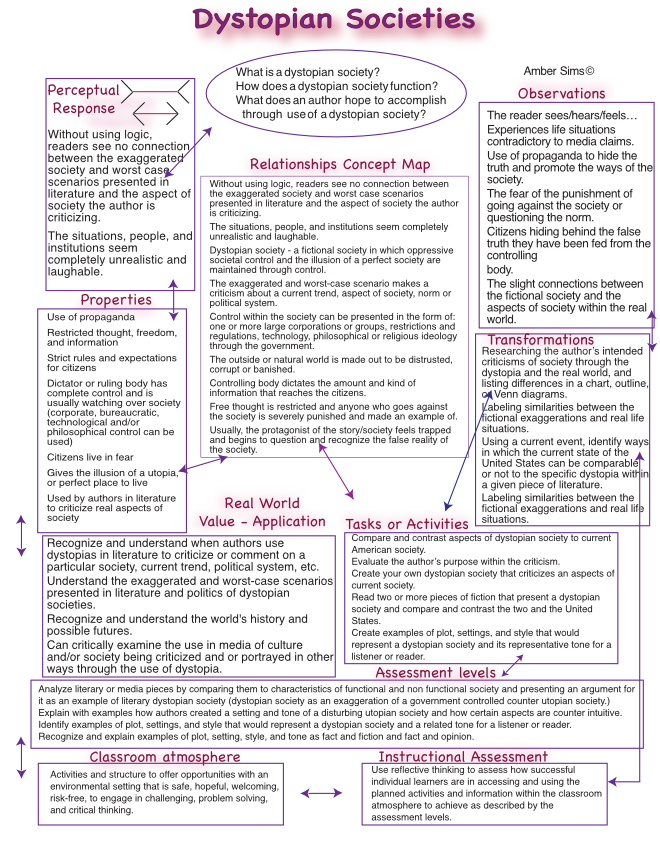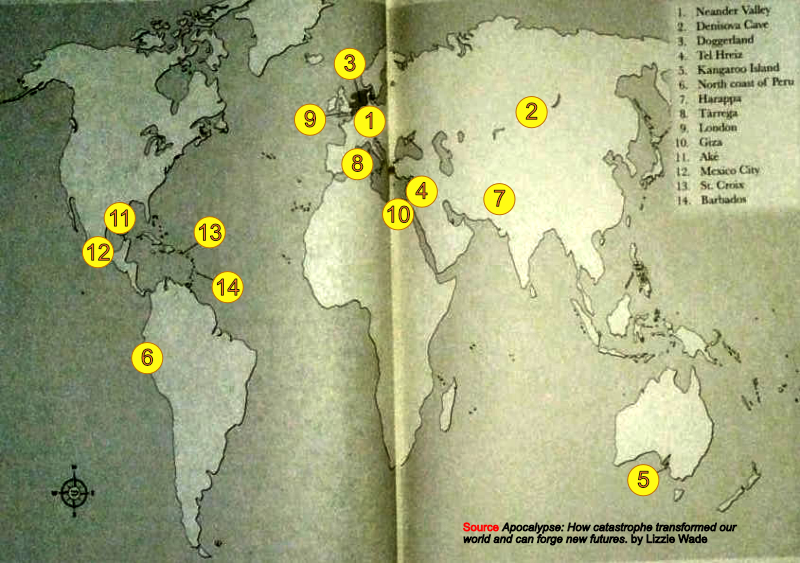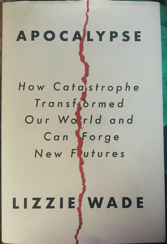
Dystopian Society
Characteristics of Dystopian Societies in planning information
Those who tell stories rule society.
Plato
Overview
- Introduction
- Planning map
- Planning outline - Information from planning map in an outline format
- Background notes about functional and dystopian societies
- Apocalypse
Introduction
This page includes information for teaching about dystopian societies and understanding them as a setting in literature.
It includes a planning map with information gathered with a framework designed around 11 categories that outstanding teachers consider when making teaching and learning decisions. Those categories include: focus questions, perceptual responses of learners initial thoughts about the topic, observations made when exploring the topic, properties that make up the concept, transformations used to construct relationships of the concepts or generalization from the observation made of those properties when they participate in related tasks and activities. Also considered is how to assess progress and achievement, the classroom atmosphere to encourage learning and instructional assessment for better teaching and learning.
Also included is a list of possible literature to use and notes and characteristics of a functional and dystopian society.
Sample planning map

Dystopian societies by Amber Sims
Information from planning map in an outline format
Focus questions
- What is a dystopian society?
- How does a dystopian society function?
- What does an author hope to accomplish through use of a dystopian society?
Perceptual response
- Without using logic, readers see no connection between the exaggerated society and worst case scenarios presented in literature and the aspect of society the author is criticizing.
- The situations, people, and institutions seem completely unrealistic and laughable.
Properties
- Use of propaganda
- Restricted thought, freedom, and information
- Strict rules and expectations for citizens
- Dictator or ruling body has complete control and is usually watching over society (corporate, bureaucratic, technological and/or philosophical control can be used)
- Citizens live in fear
- Gives the illusion of a utopia, or perfect place to live
- Used by authors in literature to criticize real aspects of society
Real world value application
- Recognize and understand when authors use dystopian societies in literature to criticize or comment on a particular society, current trend, political system, etc.
- Understand the exaggerated and worst-case scenarios presented in literature and politics of dystopian societies.
- Recognize and understand the world's history and possible futures.
- Can critically examine the use in media of culture and/or society being criticized and or portrayed in other ways through the use of dystopia.
Relationship concept map
- Without using logic, readers see no connection between the exaggerated society and worst case scenarios presented in literature and the aspect of society the author is criticizing.
- The situations, people, and institutions seem completely unrealistic and laughable.
- Dystopian society - a fictional society in which oppressive societal control and the illusion of a perfect society are maintained through control.
- The exaggerated and worst-case scenario makes a criticism about a current trend, aspect of society, norm or political system.
- Control within the society can be presented in the form of: one or more large corporations or groups, restrictions and regulations, technology, philosophical or religious ideology through the government.
- The outside or natural world is made out to be distrusted, corrupt or banished.
- Controlling body dictates the amount and kind of information that reaches the citizens.
- Free thought is restricted and anyone who goes against the society is severely punished and made an example of.
- Usually, the protagonist of the story/society feels trapped and begins to question and recognize the false reality of the society.
Observations
- The reader sees/hears/feels…
- Experiences life situations contradictory to media claims.
- Use of propaganda to hide the truth and promote the ways of the society.
- The fear of the punishment of going against the society or questioning the norm.
- Citizens hiding behind the false truth they have been fed from the controlling
body. - The slight connections between the fictional society and the aspects of society within the real world.
Transformations
- Researching the author’s intended criticisms of society through the dystopia and the real world, and listing differences in a chart, outline, or Venn diagrams.
- Labeling similarities between the fictional exaggerations and real life situations.
- Using a current event, identify ways in which the current state of the United States can be comparable or not to the specific dystopia within a given piece of literature.
- Labeling similarities between the fictional exaggerations and real life situations.
Tasks or activities
- Compare and contrast aspects of dystopian society to current American society.
- Evaluate the author’s purpose within the criticism.
- Create your own dystopian society that criticizes an aspects of current society.
- Read two or more pieces of fiction that present a dystopian society and compare and contrast the two and the United States.
- Create examples of plot, settings, and style that would represent a dystopian society and its representative tone for a listener or reader.
Assessment levels
- Analyze literary or media pieces by comparing them to characteristics of functional and non functional society and presenting an argument for it as an example of literary dystopian society (dystopian society as an exaggeration of a government controlled counter Utopian society.)
- Explain with examples how authors created a setting and tone of a disturbing Utopian society and how certain aspects are counter intuitive.
- Identify examples of plot, settings, and style that would represent a dystopian society and a related tone for a listener or reader.
- Recognize and explain examples of plot, setting, style, and tone as fact and fiction and fact and opinion.
Classroom atmosphere
- Activities and structure to offer opportunities with an environmental setting that is safe, hopeful, welcoming, risk-free, to engage in challenging, problem solving, and critical thinking.
Instructional assessment
- Use reflective thinking to assess how successful individual learners are in accessing and using the planned activities and information within the classroom atmosphere to achieve as described by the assessment levels.
Literature with dystopian societies
- The Giver by Lois Lowry. 1993. A novel that draws readers into it with determination to explain what is happening and to use all available means to discover along with Jonas the workings of the community. What is going on? Does Jonas have special powers? Are they gifts or not? Can he change or is change impossible? What must he do to have his freedom? Must he escape or adapt? What are possibilities of a better future depending on the choices he makes? Prequel to
- Gathering Blue by Lois Lowry Companion to The Giver. Kira, a unique, creative, convincing, and ethically driven young girl befriends and collaborates to uncover the mysteries and truths of her world and what exists beyond it.
- Messenger by Lois Lowry. 2004.
- The Angel Factory, Terence Blacker, a story about good and evil and the perfect life. Thomas discovers that he is adopted and that his parents are part of a worldly scheme. What is the good life and how should choose? A story equal to Lois Lowry's The Giver.
- The Secret Under My Skin, by Janet Elizabeth Mc Naughton. 2006. A futuristic story that takes place as the earth is recovering from a global ecological disaster. The main character, a teenager, orphaned at age six as a result of a power struggle for government control. As she grows her curiosity and love of reading open doors of opportunities. However, she is concerned and confused by her perceived obligations to others and her obligation to herself. The author sets her struggle against the struggle of another major character. The contrast of the way these two girls work differently ignoring each sometimes and working together makes an interesting story of intellectual and emotional development about adolescent girls. topics future 2368 science work camps education environmental degradation orphans forced child labor. Questions to Analyze the Pedagogy in the Book and reflect on pedagogy in general.
- Ender's Game by Orson Scott Card. 1985. The Earth has been attacked twice by buggers resulting in great human lose and suffering. If each attack had not been repelled, it would have meant the extinction of the human species. Fearful a third attack will be successful the military has been breeding and experimenting to create and train a commander and army that will not fail to defeat the buggers. Running out of time and successes Ender Wiggin may be the best hope as we discover in the opening sentences. I've watched through his eyes. I've listened through his ears, and I tell you he s the one. Or at least as close as we re going to get. For what we are not sure. Uncovered in this story is not only a children s adventure story about competitive laser tag or video games, but several other powerful subplots and themes. The story was written for an adult audience with children characters. However, it has been adopted by adolescent and younger readers. It is a fast paced action filled story driven by the game competition that we learn has significant military consequences for the survival of the human species. However, the book is no light weight. We learn how these characters discover their actions can have social consequences and move to make significant world differences. Differences for Ender s family, the military, politics, the world order and its affect on the world population and humanity of all intergalactic species. age 12 years - seventh grade topics video games war adolescence military breeding
- The House of Scorpions by Nancy Farmer. 2002. Incredibly well written science fiction. Future world of a drug lord and possible dilemmas faced as a consequence of cloning and future societies. An action adventure with a drug king, El Patron, and Matt, a young adolescent, who has known, as long as he can remember, that he has a mysterious relationship to El Patron. Sometimes it is great and others it is worse than being an animal on the ranch. When Matt finally discovers El Patron's true intentions he acts to thwart his plans. However, circumstances put Matt s life in danger and he has no choice but to run. Where does one run and hide from a drug lord? Is it possible that Matt can escape with his life? And if he does how long can he live before be is discovered and returned to El Patron?
- The Host by Stephenie Meyer. 2008. Parasitic aliens, Souls, take over the majority of Earth’s population and launch an all out war against the human race. However, Melanie Stryder, rebels against her host, befriends human rebels fighting the Souls, and seeks a resolution through love. science fiction upper middle levels. Also Movie, The Host. 2011.
Notes about functional and dystopian societies
Characteristics of a functional society
- Provide work or jobs for all people that can provide adequate food, health care, support of families, education, literacy, child support, daycare, dignity, and joy, for all its deserving members who believe in and support the society (comunity, nation, ...)
Causes for discontent and revolution
- Poverty
- Homelessness
- Hunger starvation
- Violence
- War, crime
- Doomsday atmosphere
- Lack of education, illiteracy
- Poor health, disease
- Underdevelopment
Categories to consider for dystopian and functinal societies
How to integrate personal morality, tradition, religion divinity, , politics (local - national) culture, public policy, ... into a unified ordered community / culture for a common purpose common good for the good of all (most?, demos - popular majority). Flourish through common people.
Who deserves what? How to reproduce privilege. Meritocracy - by ability
History
- What is tradition (customs or beliefs from generation to generation)? When does tradition go against history (alternative telling of the past)? When do people go against tradition? When can going with or against tradition become going against people? How do we decide to follow tradition or move away from tradition?
- Does providing for all needs become tradition? Are all celebrations based on tradition or are they cultural? Or are they spontaneous and novel.
- Is the past considered irrelevant or outmoded for the present?
Economy wisdom of the market, free enterprise,
- Capitalism centered discontent can be caused by - monopoly, corruption, cartels, refusal to share wealth, breeds resentment, envy, greed, hatred, and murderous impulses. Laise-faire.
- Collectivism centers discontent with equality for all, no rewards for merit,
Politics
Politics as a balance between freedom for the individual and maintenance of the social order.
Can be thought of as socialism and individualism.
Socialism centered discontent can be caused by - extended self sacrifice, slave labor, extensive labor decided by the state and for the state. Assigned life-long jobs, decide to build pyramids. To want other people to do well isn't socialism.
Individualism universal yearning for freedom. balance between solving problems from the grassroots (blind faith happenstance will solve if government gets out of the way) to top down government solutions.
How to deliver the common good to whom.
- Is government for all or limited to a selected few, rich, land owners, educated, ... ?
- Do people who speak for the people speak for all or for some of the people? Super rich? Poor?
- Is government an incorruptible defender of the people?
- Is everything in the citizen's hands? How many citizens? Democracy of for ... ?
- Is the government national, in a sense that it must be governed by the people and for the people?
- Is there as system, like education, school, media, family, culture, ... so each generation can discover its mission? In a manner where it doesn't have to do so alone?
- Who has property rights? Who owns what? Private lands vs. public lands and the commons.
- Economic rights
- Distribution of resources
Free speech
- What is the purpose of free speech? Tobe able to say anything at anytime? Lie, be untruthful, deceive others, to harm people, to keep the government from stopping people to publish or speak truth to power and criticism government officials about what the plan, what they might attempt to do, and reporting what they what they have done.
- Use media as a label to rant against free speech they don't like.
Religion
- Separation of church and state? What is belief? Should there be a state religion? Should everyone be required to participate in the same religion? Israel is a Jewish state with a majority of Palestinians (Arab Muslins).
- Godless person ...
- Philosophies that claim God, history, or nature as a comrade for tyranny or cooperation. Pyramid building?
Power
- Human beings are constantly drawn to protecting the health and well being of their family, clan, tribe, nation, by bonds of mutual loyalty (oxytoxen).
- Anger kills empathy, reasoning, and sensible decision making.
- Majority to suppress minority - Jim Crow
- Allow crop failure or use the power to create irrigation, flood control, dams levies, drain swamps, build swamps, Mangrove swamps, coral reefs, climate control ... To survive.
Emotional words
Liberal, conservative (not committed to conservation in any sense of the word), right, left, family, neighborhood, religious, minority, academic, Hollywood, sex, drugs, alcohol, consumption, technology, elite, poor, transgender, LGBT+, natural family, sexualization of children, rich, schools, marriage (perpetual biological reproduction to perpetuate a continuous political community) , pregnancy, abortion, woke (a container for anything the speaker does not approve), state supported health care, well fair, food stamps, minimum wage, universal wage, gun-control, human rights, independent judiciary, public school, private school, charter school, social change, social engineering, crime, mandatory sentencing, three strike laws, end of life, rules, cooperation, regulations, race, class, media, immigration, free-loader, free-lunch,
Regulations - standard measurements, labels,
I may be wrong, but it still may be a debate worth having.
Apocalypse

Apocalypse world map
Source

Summary
Lizzie Wade presents a unique historical perspective on apocalypses, challenging conventional wisdom and long-held stories about our past. She reveals that cataclysmic events are not endings but transformations, leaving us to wonder about their causes, and the extent of the survivors' transformations and even possible progress. She reframes human history as a series of crises and cataclysms we survived, challenging narratives from the end of the Old Kingdom of Egypt to the collapse of the Classic Maya and the Black Death. She shows how people lived through and beyond these events, even considering a new world.
The more we learn about past apocalypses, the more hope we have of surviving the next one. It won't be pleasant or fair, but the world will be different, and our cultures and communities will be too.